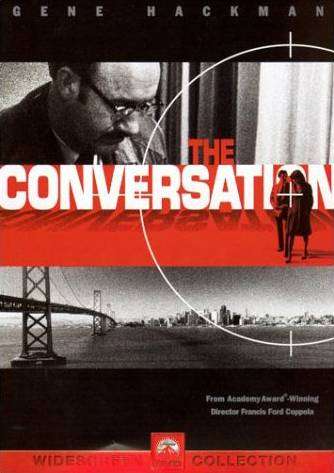The Conversation

The Conversation is a 1974 psychological thriller film directed by Francis Ford Coppola and starring Gene Hackman.
Harry Caul (Hackman) is a paranoid, socially-withdrawn surveillance expert in San Francisco who runs a personal business in which he spies on people's conversations at the behest of his clients and reports the information back to them. He is strictly professional in his activities; never questioning why his clients want those he surveys spied on, nor intervening accordingly. However, his latest assignment has been to spy on Ann (Cindy Williams), the wife of the director of a big company, and her lover Marc (Frederic Forrest). He hears in their recorded conversations the phrase: "He'd kill us if he got the chance". He thus theorizes that Ann's husband suspects she is having an affair and is planning to murder her and Marc, and thereby is torn over whether to adhere to his non-intervention rule or do something.
As it turns out, the theory he has regarding Ann, Marc and the director is dreadfully wrong.
The film is often mistakenly regarded as a reaction to the Watergate scandal. In reality, the resemblance was just a prophetic coincidence; the screenplay and filming were completed prior to the scandal hitting the press.
- Being Watched: Or, more precisely, heard.
- Big Brother Is Watching
- Downer Ending: Ann and Marc murder the director. The director's assistant, with whom they're working, knows that Caul knows the truth. They plant a bug in his own apartment and tell him about it. He tears up the place in a paranoid frenzy trying to find it, but is unable to. He resorts to playing the only thing he has left in his life: his saxophone.
- Dream Sequence
- Epic Tracking Shot: The opening shot starts in close on Gene Hackman from above and pulls back to reveal the surrounding Union Square in San Francisco.
- The Faceless: Harry's employer, played by a very well known actor, is only ever seen in deep shadows.
- Meaningful Echo: The recording of the titular conversation is played over and over, but its true meaning isn't understood until the final repetition.
- One Dialogue, Two Conversations: "He'd kill us if he had the chance." vs. "He'd kill US if he had the chance." Although they don't know Harry is listening at the time and he is not contributing a back-and-forth to the conversation, the misunderstanding on his part still fits the trope.
- One-Scene Wonder: Robert Duvall.
- Overt Rendezvous
- Properly Paranoid
- Rewind, Replay, Repeat: Almost the entire movie revolves around this trope.
- Technology Porn: In spades. Aligning playheads, long distance mikes re-mounted and aimed by snipers, and each multiple audio pass savored for it's methodical slowness. In the digital age, it still qualifies as analog porn that would make the typical Dieselpunk aficionado blush.
- Wham! Line: Turns out that "He'd kill us if he got the chance" has very different meanings based on what word you stress.